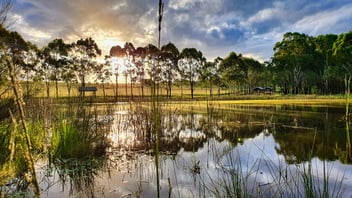What’s front of mind for the Regional, Rural and Remote Water practitioners
The Regional, Rural and Remote Water Specialist Network held two Member Circles on 31 August and the 2 September to engage with AWA members who are interested in this field. Over 90 people attended the two events. The two sessions highlighted a number of pressing challenges for ensuring safe and reliable water in remote and regional communities. The committee aims to develop a range of activities covering many of these topics over the next two years.
Staff retention, education and training:
Front and centre was the challenge of attracting qualified technical staff to operate and manage the water assets as well as those who regulate their performance to the regions and the need for innovative ways to retain their skills in the area. Through necessity, many operators are jack-of-all-trades, and therefore it is paramount that they receive the appropriate training. Providing this training has been hampered by the tyranny of distance, and online courses don’t address the practical nature of the operations.
Sharing technical resources across local jurisdiction boundaries, setting up forums to discuss what is and isn’t working across the regional parts of Australia, and installing fit-for-purpose appropriate technology that can be operated and maintained locally were some of the suggestions for addressing the technical difficulties encountered by regional utilities.
Resilient and reliable sources of water:
The challenges of climate change and the uncertainties associated with other planning assumptions around population growth, urbanisation, changes in non-residential user demands and the competition for water resources were highlighted as hampering investment decisions, and in some instances placing some locations on the brink of running out of water.
Fit-for-purpose treated water sourced from alternative sources (such as stormwater and wastewater), together with new and emerging technologies for treating drinking water were suggested.
Water conservation to complement supply options:
High system losses in networks and treatment operations and high user demands are characteristically found across the regional areas. It is logical to first seek to reduce user demands where appropriate and improve the efficiency of the delivery systems. Water conservation generally costs less than producing water.
Modifying the standards around the watering or greening of public spaces, using fit-for-purpose water for open space irrigation, and conducting community engagement to change behaviour around demand and usage were some of the ideas put forward by the participants.
Levels of treatment:
A number of locations are faced with poor quality source water, these include contaminants such as PFAS and other Contaminants of Emerging Concern (CEC). Ongoing risk identification is hampered by financial and technical resources. As discussed above, not all water needs to be treated to drinking quality standards. Customer engagement and choice with regards to the level of water treatment and supply of drinking quality water is needed.
Strategies for treatment process optimisation, especially for recycled water, are needed, which include reviewing the ADWQ guidelines and addressing health-based targets and log removal values.
Monitoring performance:
There was expressed need to have good data to make good decisions. The ongoing monitoring of the system and the consistently applied metrics for water consumption and efficiency were considered important for reporting and tracking progress. This requires funding for the infrastructure and adequately trained personnel to collect and interpret the data.
Funding support:
Finally, support is needed from state governments through subsidy programs for capital infrastructure and upgrades, since smaller utilities and councils do not have the capital to invest in infrastructure to ensure reliable and safe water supplies in remote and regional locations.
The committee will be considering these issues and preparing an action plan to facilitate discussion and learning across these topics over the next two years.

